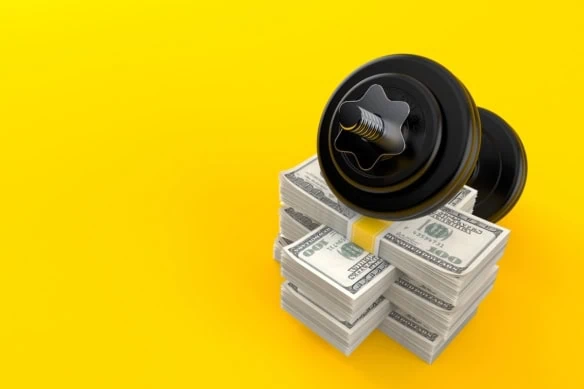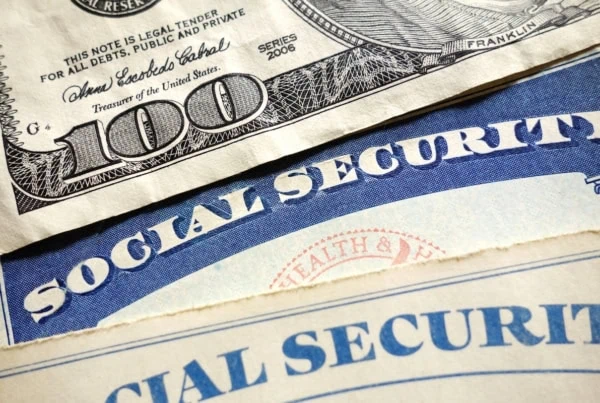“Am I financially stable?” Well, the answer you get would likely depend on who you ask.
Some people wouldn’t consider a person to be financially stable until they become a debt-free homeowner with ample retirement savings. Others would consider simply being able to feed their family and pay their bills “financially stable,” even if they were living paycheck to paycheck. It’s truly in the eye of the beholder.
So, how can you really know whether you’re actually doing well or should be concerned?
Today, I’m going to share a list of traits and circumstances—compiled by several editors here at Young and the Invested—that you can look at as signals that you’re financially secure.
Financially Healthy People Have the Following in Common

Before I get started, let me be upfront: There are no truly objective ways of measuring financial security—different people will have different views about exactly what it means to be on sound footing, money-wise.
However, to ensure various viewpoints were considered, I asked several of our editors to weigh in on what it means to be financially stable. That resulted in the following list.
The more of these statements that apply to you, the better you can start to feel about the current state of your finances. But, as we frequently suggest, the best way to determine how your money is doing (and plan for where it’s going) is to reach out to a professional financial advisor.
1. You pay your bills on time.

Do you pay your rent, utilities, credit cards, and other bills on time every month? You may be doing financially better than more people than you realize. According to the Federal Reserve Bank of Philadelphia’s LIFE Survey Report, 22.5% of respondents said they couldn’t pay some or any of their bills in April 2024.
While some bills are predictable (rent) and others vary (credit cards), paying bills late—or worse, not at all—can result in some severe financial consequences. You might be charged late fees, have your bill sent to collections (which hurts your credit score), or desperately take on high-interest debt such as payday loans to “catch up” … which, if those go unpaid, could send you further into a debt spiral.
So, paying all your bills on time, while boring, straightforward, and obvious, is a pretty reliable sign of financial health.
Related: How to Reverse Budget With ‘Pay Yourself First’ Budgeting
2. You have a budget (and follow it).

Whether you budget down to the penny or have a more flexible plan, having a budget is a positive sign of financial health.
Roughly two-thirds of Americans were living paycheck to paycheck as of November 2024, according to PYMNTS Intelligence. It’s a difficult financial situation to be in (and get out of), but budgeting is one place many of those people can start.
When you begin budgeting, you gain a big-picture view of your finances that you might not otherwise see—and that can help you find potential spending changes that can give you more wiggle room and allow you to start building up your savings.
To be clear: When you have money to spare, budgets can and should include discretionary spending, too. Squeezing every dollar as tightly as possible can actually backfire and cause some people to break their budgets. If you’re paying all your bills as well as setting aside money for short-term, mid-term, and long-term goals, there is no issue spending some money recreationally. Some people use a reverse budgeting method to ensure their “fun money” doesn’t overtake financial priorities.
Do you want to get serious about saving and planning for retirement? Sign up for Retire With Riley, Young and the Invested’s free retirement planning newsletter.
3. You’re saving for retirement.

Are you focused not just on present needs, but actually putting money away toward your future, too?
That’s a great sign.
In case you’re wondering, the prevailing wisdom is to save at least 15% of your pre-tax annual income toward retirement. (If you receive an employer match, that counts toward the 15%.) However, if you plan to retire early or live a lavish lifestyle during retirement, a higher percentage may be appropriate.
If you’re saving 15% or more through retirement accounts, you’re already well ahead of the average person.
If you’re not saving for retirement at all, the best—and most obvious—advice I can give is to start. But if you’re looking for a specific gameplan, I spend a little time in my article on maxing out your 401(k) to address how to prioritize your retirement accounts to maximize your money’s growth potential.
Related: What Are the Average Retirement Savings By Age?
4. Your debt is manageable.

The 2024 CNBC International Your Money Financial Security Survey asked respondents “What does financial security look like?” Those surveyed were asked to select all answers that applied. The most commonly chosen answer, selected by 59% of respondents, was having no outstanding debts.
I’m inclined to agree that having no debt is a good sign that you’re financially secure.
But I also believe it’s possible to have some types of debt, as long as that debt is manageable, and still be in good financial health.
For instance, a mortgage can be considered “good” debt as it provides housing security and it’s an asset that often increases in value. But that mortgage still has to be manageable. If you’re barely able to keep up with mortgage payments because you stretched past your original budget, that mortgage can be considered “bad” debt.
Expanding that, you don’t want too much of your income going toward debt of any type. Lenders frequently look at one’s debt-to-income ratio when determining financial health, and they’ll often consider you to be doing well if your debt-to-income ratio is 35% or less.
Related: Don’t Make These 7 Mistakes When Choosing a Financial Advisor
5. You have a fully funded emergency fund.

In the aforementioned CNBC survey, the second most common answer for “What does financial security look like?” was “high levels of savings,” at 47%.
What’s considered a “high” level of savings will vary from person to person, but a good goal to aim for is to have a fully funded emergency fund.
Every adult should have an emergency fund. You never know when a natural disaster will strike, a major health issue will arise, or you’ll lose your job. Your emergency fund gives you peace of mind that you won’t have to take on high-interest debt if you suddenly need a large sum of money.
Experts generally suggest your emergency fund has enough money to cover three to six months’ worth of living expenses. Some prefer a slightly larger fund to give them more time to find a new job or recover from a medical issue. If your emergency fund has at least that much, it’s a good sign that you’re financially secure.
This money is best held in a liquid, interest-bearing account, such as a money market account or high-yield savings account.
Related: 8 Ways Higher Tariffs May Lead to Higher Costs for Americans
6. Your net worth is increasing over time.

Net worth is a simple calculation: assets minus liabilities.
But it can have a lot of variables. Your assets include all of the money you have in your bank and investment accounts, as well as physical possessions such as your home, car, collectibles, and more. Meanwhile, liabilities include debt such as a mortgage, student loans, and outstanding credit card balances.
It’s actually easy to have a negative net worth—where liabilities outweigh assets. For example, a recent college graduate might have a large amount of student debt but no high-value assets, and thus a negative net worth.
In general, it’s better to have a positive net worth than a negative net worth. But simply heading in the right direction (from negative to less negative, or positive to more positive) is a good sign of improving financial health.
Related: How to Protect Your Wealth: 10 Proven Strategies
7. You have job security.

Short of having a guaranteed long-term contract (hello, MLB), few people have airtight job security. Still, if you’re a high performer within an in-demand industry, it’s fair to say you have relatively stable employment—and that’s a good indicator of future financial health.
That’s because job stability allows you to be strategic with your money, because you can think past how much money you currently have and toward the money you’ll also be making in the future.
Also, let’s say you do lose your job. If you have enough education or expertise that you could expect to quickly find another role, that’s still a positive sign.
Related: Career Compensation Is More Than Salary: 10 Other Financial Perks to Consider
8. You’re insured.

A person could be debt-free, have a high-paying job, be saving a substantial percentage of their income, and still be at tremendous financial risk … if they’re not properly insured.
No health insurance? Three days in the hospital could cost $30,000, according to HealthCare.gov. According to nonprofit organization KFF, as of 2023, 62% of uninsured adults reported having health care debt. But even having insufficient health insurance can hurt, with KFF finding that 44% of those who are insured carry medical debt.
The same warnings apply for your home, your automobile, or any other aspect of life where lack of insurance could result in massive instant losses.
Health insurance, homeowners or renters insurance, auto insurance, and long-term disability insurance are among the various protections it’s helpful to have. Being able to afford these plans (and getting them), then, is a great sign of financial stability.
Related: How to Negotiate Medical Bills in Collections [13 Steps to Follow]
9. You’re financially literate.

Do you know what direct indexing is? Or how a backdoor Roth conversion works? That’s OK—they’re advanced financial topics that, while helpful, don’t apply to everyone.
But having basic financial literacy is vital to identifying and reaching your monetary goals.
“Do you know why people who win the lottery always end up going bankrupt? Because if they worried about their money, they wouldn’t have played the lottery in the first place.” That quote by comedian Anthony Jeselnik is missing a choice word or two, but it nods to the very real idea that being stable isn’t just about having a pile of money. There are numerous stories of people who won millions in the lottery only to end up even poorer than they were before winning.
Conversely, if you manage your money well, you can be financially secure with even modest earnings.
So, if you rifle through this list of common financial topics, and you have a good grasp of most or all of them, that’s a decent sign you’re financially secure.
Do you want to get serious about saving and planning for retirement? Sign up for Retire With Riley, Young and the Invested’s free retirement planning newsletter.
10. You’ve talked to a financial advisor.

Asking for help isn’t a sign of weakness. That’s true in just about every avenue of life, including your finances.
You don’t know what you don’t know. And if you know you don’t know everything about your money, it can absolutely pay off to discuss your current financial situation and future plans with a financial advisor.
In the 2024 Northwestern Mutual Planning & Progress Study, 64% of respondents who work with a financial advisor said they feel financially secure, compared to only 29% of people who don’t use an advisor.
Talking to a professional won’t magically change a bad financial situation overnight, but it can put you in control to fix anything that’s wrong—and if you’re already in a good place financially, a pro can refine your plan to maximize your wealth.
If you want to learn more about your financial situation or map out your financial future, you can schedule a call with Riley Adams, CPA, a licensed fiduciary financial advisor with investment advisory services offered through NewEdge Advisors.
Want to talk more about your financial goals or concerns? Our services include comprehensive financial planning, investment management, estate planning, taxes, and more! Schedule a call with Riley to discuss what you need, and what we can do for you.
Related: How to Choose a Financial Advisor









